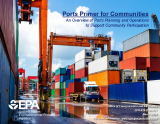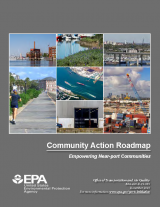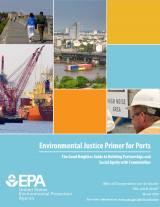Community-Port Collaboration Pilot Projects
- Community-Port
Collaboration Pilot Projects - New Orleans
Pilot Project - Savannah
Pilot Project - Seattle
Pilot Project
This page provides an overview of community-port collaboration pilot projects conducted in four communities, the toolkit that pilot participants tested, and additional training and resource materials that resulted from the pilots. These pilot projects helped to build stronger partnerships and equip port operators and community stakeholders with information, skills and tools to effectively develop and implement collaborative actions to improve air quality at ports. The lessons learned and resources from the pilots are intended to support community-port collaboration at other ports across the country.
On this page:
- Pilot Projects in Four Locations
- Community-Port Collaboration Toolkit Update
- Training and Other Resources from Pilots
Pilot Projects in Four Locations
In 2016, EPA selected three applicants from more than twenty near-port communities’ and ports’ applications to receive technical assistance and pilot the Community-Port Collaboration Toolkit. Additionally, in 2017 EPA initiated a fourth pilot in Providence, Rhode Island.
The pilot projects included:
New Orleans, Louisiana: Port of New Orleans, in collaboration with the Deep South Center for Environmental Justice and the Lower 9th Ward Center for Sustainable Engagement and Development, applied to participate in the pilot program to build collaborative relationships between the port and near-port communities.
Savannah, Georgia: Harambee House, Inc. / Citizens for Environmental Justice (Harambee House) applied to participate in the pilot program to strengthen collaboration between near-port communities, Georgia Ports Authority and other Port of Savannah terminal operator/owners.
Seattle, Washington: The Port of Seattle, in collaboration with the local non-profit organization Just Health Action, applied to participate in the pilot program to build collaborative relationships between the port and two near-port communities.
Providence, Rhode Island: In 2017, EPA initiated a streamlined pilot project working with the Environmental Justice League of Rhode Island (EJLRI) and near-port community stakeholders of the Port of Providence (ProvPort) in Providence, Rhode Island.
A lessons learned training module for the pilot projects has been developed and is available on the Community-Port Collaboration: Training Modules and Resources webpage.
Community-Port Collaboration Toolkit Update
The three document toolkit summarized below and discussed in more detail on the Community-Port Collaboration Toolkit webpage was updated based on feedback received from participants in the pilots projects, other community stakeholders, port authorities and businesses, and government partners. The documents are designed to be used as companion documents to each other. The update includes the PDF documents as well as creation of web format versions of the Community Action Roadmap, and the Environmental Justice Primer for Ports (Ports Primer for Communities already existed in web format).
Ports Primer for Communities
The Ports Primer for Communities is an interactive tool and reference web area and document that characterizes the port industry sector, including environmental and community health impacts associated with port activities.
Community Action Roadmap
The Community Action Roadmap is an implementation companion for the Ports Primer for Communities that provides a step-by-step process for building capacity and preparing community stakeholders.
Web Area: Community Action Roadmap: Empowering Near-Port Communities
A Training Facilitators Resource and training module are available for the Community Action Roadmap on the Community-Port Collaboration Toolkit webpage.
Environmental Justice Primer for Ports
The Environmental Justice Primer for Ports is designed to inform the port industry sector of the perspectives, priorities, and challenges often unique to communities with environmental justice (EJ) concerns. In additional to orienting the port sector about EJ considerations, this resource is structured to provide step-by-step processes to improve the effectiveness of port and community engagement in addressing concerns of impacted residential communities.
Training and Other Resources from Pilots
Several training materials were developed as part of the pilot projects and can be accessed on the through the Community-Port Collaboration: Training Modules and Resources webpage. Training materials include the following.
- Pilot Projects Lessons Learned Training
- Community-Port Collaboration Toolkit Training
- Training Facilitators Resource: Community-Port Collaboration Toolkit - Designed to provide an overview to documents and web areas with options for increasing detail based on the allotted time for training.
- Module 1 - Ports Primer for Communities
- Module 2 - Community Action Roadmap
- Module 3 - Environmental Justice Primer for Ports
- Community Benefits Agreement Training - Seeks to help participants learn the basics of CBAs, develop a shared language for communicating community concerns, and engage in dialogue around lessons learned from other similar CBA processes.



